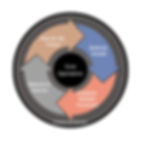Do You Need an Organizational Effectiveness Coach?
- Tracy Hulett
- Jul 23, 2025
- 3 min read
As a business owner, you became successful because you're exceptional at what you do. Whether you're manufacturing widgets, providing professional services, or running a nonprofit program, your expertise in your core business is what got you here. But here's what many successful leaders discover: being great at your core business doesn't automatically make you great at everything that surrounds it.
The Hidden Complexity of Business Success
Think of your business like a series of concentric circles. At the center is your core operation, the thing you do brilliantly. But surrounding that core are critical functions that determine whether your business thrives or merely survives: planning for the future, building systems for growth, establishing reliable processes, and continuously measuring and improving performance.

All of this sits within your organizational culture, the invisible force that determines whether your team performs at a high level and shares genuine commitment to your organization's success – or just shows up to collect a check.
When any of these surrounding layers start to crack, it doesn't matter how excellent your core business is. The whole system suffers.
The Warning Signs: When to Consider Outside Help
You're Experiencing High Turnover If good people keep leaving, it's rarely about money alone. High turnover often signals problems in your processes, growth planning, or culture. When you're losing institutional knowledge and constantly training new people, you're not just losing employees, you're losing momentum.
Growth Has Stalled Your core business might be solid, but if you're not growing, something in those surrounding layers isn't working. Maybe your processes can't scale, your planning lacks strategic vision, or your culture isn't attracting and retaining the talent you need to expand.
You're Stuck in Operational Quicksand When you find yourself constantly firefighting instead of leading, when the same problems keep recurring, when you feel like you're working harder but not getting ahead, these are signs that your business systems need attention.
Cultural Warning Signs Does your team seem disengaged? Are silos forming between departments? Is innovation stagnant? A weak culture doesn't just affect morale, it directly impacts performance, customer satisfaction, and your bottom line.
Do you need an organizational effectiveness coach?
Why Waiting for Crisis Is Costly
Many business owners wait until they're in crisis mode before seeking help. By then, the problems have compounded, solutions are more expensive and disruptive, and recovery takes longer. It's like waiting until your car breaks down on the highway instead of getting regular maintenance.
The most successful businesses seek strategic support when they're stable enough to implement changes thoughtfully, but early enough to prevent small issues from becoming major obstacles.
The Strategic Advantage of Getting Help Early
Consider this: you wouldn't expect to be an expert accountant, lawyer, and IT specialist just because you run a business. The same logic applies to organizational effectiveness. The skills needed to plan for the future, build scalable processes, and cultivate high-performance culture are specialized disciplines.
Working with an organizational effectiveness consultant isn't an admission that you're not good at running your business, it's recognition that you're savvy enough to focus on what you do best while ensuring the supporting systems work just as well.
Making the Decision
Ask yourself these questions:
Are you spending more time managing problems than pursuing opportunities?
Do you have clear, actionable plans for where your business will be in three years?
Are your processes documented and scalable, or do they depend too heavily on specific people?
Would you describe your organizational culture as a competitive advantage?
Are you confident in your ability to measure what matters and improve systematically?
If you answered "no" to several of these questions, it might be time to consider getting strategic support.
Moving Forward
Your core business expertise has taken you this far, and it will continue to be your greatest asset. But in today's competitive environment, excellence in your core business is just the entry fee. Sustained success requires excellence in all the layers that surround and support that core.
The question isn't whether you need help with everything, it's whether you need help with the right things at the right time. Sometimes the smartest business decision is recognizing that getting strategic support today prevents crisis management tomorrow.
The goal isn't to replace your expertise, it's to expand it by ensuring every part of your business works as well as your core operation does.
